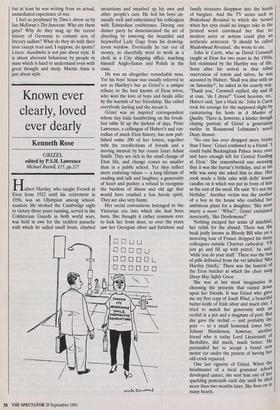Known ever clearly, loved ever dearly
Kenneth Rose
GRIZEL
H ubert Hartley, who taught French at Eton from 1922 until his retirement in 1956, was an Olympian among school- masters. He stroked the Cambridge eight to victory three years running, served in the Coldstream Guards in both world wars, was held in awe for the reckless panache with which he sailed small boats, climbed mountains and smashed up his own and other people's cars. He fed his boys un- usually well and entertained his colleagues with Edwardian exuberance. During one dinner party he demonstrated the art of abseiling by lowering the beautiful and bejewelled Lady Gage from his drawing- room window. Eventually he ran out of money, so cheerfully went to work as a clerk in a City shipping office, teaching himself Anglo-Saxon and Polish in the train.
He was an altogether remarkable man. Yet his boys' house was usually referred to not as Hartley's but as Grizel's: a unique tribute to the best known of Eton wives, who won the love of boys and beaks alike by the warmth of her friendship. She called everybody darling and she meant it.
Grizel was an inspired correspondent whose tiny italic handwriting on the break- fast table lit up the darkest of days. Peter Lawrence, a colleague of Hubert's and cus- todian of much Eton history, has now pub- lished some 200 of her letters, together with the recollections of friends and a moving memoir by her cousin Janet Adam Smith. They are rich in the small change of Eton life, and change comes no smaller than in a public school. Yet they -reflect more enduring values — a long lifetime of reading and talk and laughter; a generosity of heart and pocket; a refusal to recognise the burdens of illness and old age that would have crushed a less heroic spirit. They are also very funny.
Her social conventions belonged to the Victorian era into which she had been born. She thought it rather common ever to lock her front door, so over the years saw her Georgian silver and furniture and family treasures disappear into the hands of burglars. And the TV series such as Brideshead Revisited to which she turned when her eyes could no longer take in the printed word convinced her that no modern actor or actress could play an authentic aristocrat. 'It should be called Maidenhead Revisited,' she wrote to me.
John le Cane, who as David Cornwell taught at Eton for two years in the 1950s, felt victimised by the Hartley way of life. Soon after his arrival in that tribal reservation of totem and taboo, he was accosted by Hubert. 'Shall you dine with us on Saturday?', he asked in his courtly way. `Thank you,' Cornwell replied, shy and ill at ease, `do I dress?' Good heavens, no,' Hubert said, 'just a black tie.' John le Carte took his revenge for the supposed slight by caricaturing his hosts in A Murder of Quality. There is, however, a kinder though cloying portrait of Grizel a generation earlier in Rosamond Lehmann's novel Dusty Answer.
`No one has ever dropped more bricks than I have,' Grizel confessed to arfriend. 'I could build Buckingham Palace twice over and have enough left for Central Feeding at Eton.' She remembered one morning that it was the bursar's birthday, and as his wife was away she asked him to dine. Her cook made a little cake with dolls' house candles on it which was put in front of him at the end of the meal. He said: 'It's not my birthday.' Another victim was the mother of a boy in the house who confided her ambitious plans for a daughter: 'She must marry a moor."What?', Grizel exclaimed innocently, 'like Desdemona?' Nothing escaped her sense of mischief, her relish for the absurd. There was the beak justly known as Bloody Bill who on a motoring tour of France dropped his three colleagues outside Chartres cathedral. just go and fill up with petrol,' he said, `while you do your stuff.' There was the box of pills delivered from the vet labelled 'Mrs Hartley (bitch).' There was the funeral of the Eton butcher at which the choir sang Sheep May Safely Graze. She was at her most imaginative in choosing the presents that rained down upon her friends. It was Grizel who gave me my first copy of South Wind, a beautiful butter-knife of Irish silver and much else. I tried to match her generosity with an orchid in a pot and a magnum of port. But she gave the orchid — and probably the port — to a small homesick lower boy. Johnny Henderson, however, another friend who is today Lord Lieutenant of Berkshire, did much, much better. He persuaded her to accept a brand new motor car under the pretext of having her old crock repaired. One last vignette of Grizel. When the headmaster of a local grammar school developed cancer, she sent him one of her sparkling postcards each day until he died more than two months later. She lives on in many hearts.


































































 Previous page
Previous page